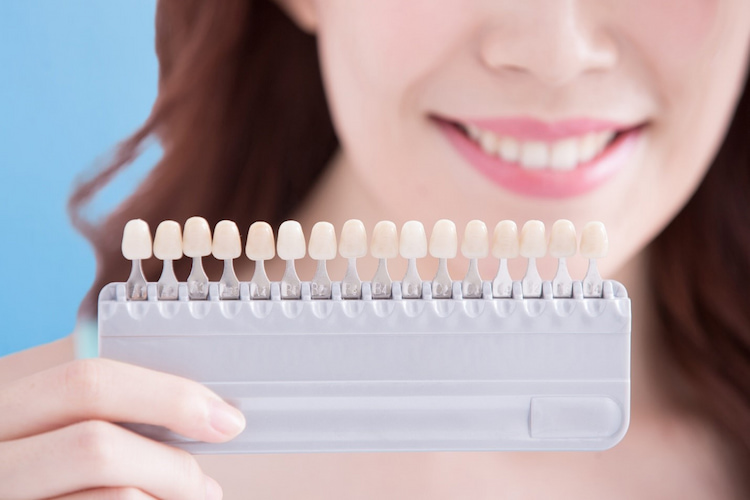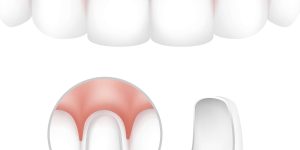While veneers are often associated with cosmetic dentistry, there are several non-cosmetic reasons to get veneers that can greatly improve your oral health and overall dental function. Veneers are a versatile treatment option that can do more than just enhance the appearance of your smile. They can also protect, strengthen, and restore your teeth, addressing issues like tooth sensitivity, misalignment, and wear. In this blog post, we’ll explore how veneers can benefit your oral health beyond just looks, focusing on the functional advantages they offer.
Improving Oral Health with Veneers
Veneers are thin shells of porcelain or composite resin that are bonded to the front surface of your teeth. Though they’re known for their cosmetic benefits, they also have significant non-cosmetic advantages that can improve the health and function of your teeth. Let’s dive into how veneers can enhance your overall oral health.
Enhancing Tooth Strength and Durability
One of the key functional benefits of veneers is that they can enhance the strength and durability of weakened teeth. If you have teeth that have become brittle or are prone to cracking due to previous damage or wear, veneers can provide an additional layer of protection. The material used for non-cosmetic dental veneers, especially porcelain, is incredibly durable and can withstand daily wear, preventing further damage to the natural tooth underneath. This added strength means you can continue eating and speaking without worrying about your teeth breaking or becoming more vulnerable over time.
Protecting Teeth from Damage and Decay
Veneers act as a protective shield for your natural teeth. If your teeth have been weakened due to tooth sensitivity or decay, veneers can cover the affected areas, protecting them from further harm. This is particularly helpful for people who are at risk of developing more severe tooth decay. By covering the tooth with a veneer, you prevent bacteria from reaching the inner layers, thus reducing the risk of further damage and decay. In this way, veneers contribute to better long-term dental health by acting as a barrier against harmful bacteria and other external factors.
Reducing Tooth Sensitivity and Discomfort
For people who experience tooth sensitivity due to enamel erosion or cracks, veneers can help provide relief. The thin layer of material covers the exposed surfaces of your teeth, shielding them from extreme temperatures and other irritants that cause discomfort. This can be especially beneficial for individuals who struggle with sensitivity when eating hot or cold foods and drinks. Veneers create a smoother, more comfortable surface that helps reduce discomfort, making it easier to enjoy a wider variety of foods without the fear of sudden pain.

Functional Benefits of Veneers for Dental Alignment
Veneers are not only cosmetic tools but can also play a role in improving the function and alignment of your teeth. If you have mild alignment issues, veneers may be a less invasive and quicker solution than traditional orthodontic treatments.
Correcting Mild Tooth Misalignment
While veneers for tooth strength and appearance are common, they can also be used to correct minor tooth misalignment. If you have slightly crooked or uneven teeth, veneers can help create a more even and uniform appearance. By placing veneers on the affected teeth, your dentist can reshape them to align with the rest of your smile. This can often be a quicker and less expensive alternative to braces or aligners for those who don’t require major realignment. Veneers for misalignment provide a functional benefit by improving both the look and the functionality of your bite.
Restoring a Balanced Bite
A balanced bite is essential for healthy chewing and overall dental health. If you have uneven teeth or dental wear that’s affecting how your teeth come together, veneers can help restore balance. By placing veneers on the teeth that are causing the imbalance, you can correct the way your upper and lower teeth meet. This can lead to better chewing function and reduce strain on your jaw, making it easier to bite and chew without discomfort. This treatment can be particularly helpful for people with misaligned bites or those who suffer from jaw pain due to uneven teeth.
Preventing Future Jaw Pain and Dental Issues
An improper bite or misaligned teeth can lead to several long-term issues, including jaw pain, headaches, and even damage to your other teeth. Veneers can prevent these problems by creating a more stable bite, which reduces the likelihood of developing dental issues like TMJ disorders. By addressing bite problems early, veneers can prevent the need for more complex and expensive treatments down the road. This can save you time and money, and prevent discomforts, while improving your overall quality of life.
Transform Your Smile with Pearl Dental Group
Ready to improve your oral health and function with veneers? At Pearl Dental Group, we offer personalized care to help you achieve a stronger, healthier smile. Contact us today to schedule your consultation and learn how veneers can enhance both your smile and dental well-being. Your healthy smile starts here!
Preventing Further Dental Problems with Veneers
Another significant advantage of veneers is their ability to prevent further dental problems. If you have worn-down or cracked teeth, veneers can provide critical protection and help you avoid more serious dental complications in the future.
Protecting Worn or Cracked Teeth
Teeth that are cracked or worn down are at greater risk for further damage. Veneers for cracked teeth are designed to cover and protect the damaged areas, preventing the cracks from deepening and causing more severe damage. The porcelain or composite material used for veneers is both strong and durable, making it an excellent option for safeguarding vulnerable teeth. By covering these teeth with veneers, you help preserve their natural structure and avoid the need for more invasive treatments, such as root canals or extractions.
Enhancing the Lifespan of Your Natural Teeth
While veneers are often used to improve the appearance of teeth, they also help protect and prolong the lifespan of your natural teeth. The added layer of protection helps keep the underlying tooth intact and reduces the risk of further damage or decay. This is particularly important for teeth that have already undergone some wear and tear. With proper care and maintenance, non-cosmetic dental veneers can extend the life of your natural teeth, saving you from the need for more extensive restorative procedures down the line.
Minimizing the Need for More Invasive Procedures
Veneers can act as a preventive measure, reducing the likelihood that you’ll need to undergo more invasive dental procedures in the future. For instance, instead of opting for a crown or root canal to treat a cracked or decayed tooth, a veneer may be a less invasive option that can achieve similar functional results. By protecting and strengthening your teeth with veneers, you can avoid the higher costs, longer recovery times, and greater risks associated with more complex treatments.

When Are Veneers the Right Option for Functional Reasons?
While veneers are not always the first choice for addressing dental issues, they can be an excellent option for certain functional concerns. It’s important to understand when veneers are the right solution and when other treatments may be more appropriate.
Evaluating Whether Veneers Are Right for You
Veneers are a great option for people who have mild to moderate dental issues, such as tooth sensitivity, misalignment, or worn teeth, and are looking for a less invasive treatment. Your dentist will evaluate your individual needs and help you determine whether veneers are the right choice. If you have more severe alignment issues or significant decay, other treatments like braces or crowns may be a better option. However, if your primary concern is enhancing tooth strength and preventing further damage, veneers can be a highly effective solution.
Veneers vs. Other Functional Dental Treatments
When deciding between veneers and other functional dental treatments, it’s important to weigh the benefits of each. For example, if you need significant teeth realignment, braces or clear aligners may be more appropriate than veneers. However, if your issue is primarily with tooth wear, sensitivity, or minor misalignment, veneers can provide both functional and aesthetic benefits. Veneers vs crowns for function is another common comparison, with veneers offering a more conservative approach for improving tooth function while still maintaining a natural appearance.
How Dentists Determine the Need for Veneers
Your dentist will assess the condition of your teeth and consider factors like the extent of any damage, misalignment, and tooth sensitivity when recommending veneers. They will also take into account your oral health goals, whether they are functional, aesthetic, or both. A thorough examination and consultation will help determine whether veneers are the best solution for your specific dental needs.
Conclusion
Veneers are often thought of as a purely cosmetic solution, but they offer numerous non-cosmetic reasons to get veneers that can greatly improve your oral health and function. Whether you’re looking to protect worn or cracked teeth, reduce tooth sensitivity, or restore a balanced bite, veneers provide a versatile, effective option. If you’re considering veneers for tooth strength, function, or longevity, be sure to consult with your dentist to see if they’re the right fit for your needs.
For a personalized consultation, contact Pearl Dental Group today. Our experienced team is here to help you achieve both a beautiful and healthy smile!
FAQs
1. Can veneers help with tooth sensitivity?
Yes, veneers can provide relief from tooth sensitivity by covering exposed areas of your teeth and shielding them from hot and cold temperatures.
2. Are veneers a good option for fixing misaligned teeth?
Veneers are ideal for correcting minor misalignment and can provide a more even appearance without the need for braces.
3. What are the long-term benefits of veneers for oral health?
Veneers can protect your natural teeth, prevent further damage, and enhance tooth strength, leading to better long-term oral health.
4. Can veneers prevent further damage to worn-out teeth?
Yes, veneers act as a protective layer for worn-out teeth, preventing further deterioration and preserving the tooth’s structure.
5. How do veneers compare to crowns for restoring tooth function?
Veneers are a less invasive option than crowns for restoring tooth function, especially when only a thin layer of protection is needed, whereas crowns may be more appropriate for severely damaged teeth.









